Megan and Mark evaluated the Legal Aid NSW’s Civil Law Service for Aboriginal Communities, which began in 2013 and has since provided free or low cost legal services to 17 Aboriginal communities throughout NSW and to women in Silverwater Prison. For the evaluation we used Ngaa-bi-nya, an Aboriginal evaluation tool developed by Megan. This was pre-Yulang.

You can read a brief summary of the work in Legal Aid NSW’s newsletter, or see the poster we developed for Health Justice Australia’s 2019 conference.
And here’s the executive summary.
Executive summary
The mixed-methods, Aboriginal-led evaluation of the Civil Law Service for Aboriginal Communities (CLSAC) shows it is an informed, warm and compassionate legal service for Aboriginal and Torres Strait Islander people and communities that works together with selected communities and prisons to deliver the civil law services those communities want in a way those communities want.
Over five years, CLSAC’s growth has been both rapid and thoughtful, while operating within the constraints of resources and the landscape. It has extended its reach into more communities, building partnerships with community-based and statewide services, and achieving good results with individual clients and for families and communities.
It shows respect for the locations into which it is invited, engages deeply, and works in accordance with Aboriginal and Torres Strait Islander people’s values and processes.
Its staff are skilled and dedicated, with a mix of legal and non-legal positions. Its success depends on the contribution of both Aboriginal and Torres Strait Islander cultural knowledge and legal knowledge, and its continued success depends on recognising both equally. Other critical success factors are its client focus, its depth of engagement in communities, its deep respect for Aboriginal and Torres Strait Islander culture, the relationships it builds, the time it takes and the flexibility it offers. CLSAC has a supportive service home in Legal Aid NSW and the support of staff. It has strategies to develop Aboriginal and Torres Strait Islander professionals, to develop cultural awareness of all staff, and to engage in broader sectoral and societal developments to support Aboriginal and Torres Strait Islander people.
CLSAC has grown to a point where it can critically reflect, consolidate, and plan to ensure its sustainability and its strategic growth in trying to meet Aboriginal and Torres Strait Islander people’s civil law needs.
Aboriginal and Torres Strait Islander people in prisons and in communities in NSW will benefit if CLSAC and Legal Aid NSW can:
- ensure that all Aboriginal and Torres Strait Islander people in NSW have access to the type of services that CLSAC offers
- install and support Aboriginal and Torres Strait Islander leadership of CLSAC, as it envisions
- broaden CLSAC’s offering beyond civil law to help identify and meet all the legal needs of its clients
- work across sectors to include access to social and emotional wellbeing support, given its connection to people with urgent, complex and/or unmet legal needs
- ensure CLSAC transfers the skills developed to Aboriginal and Torres Strait Islander communities and, where appropriate, other legal services.



















